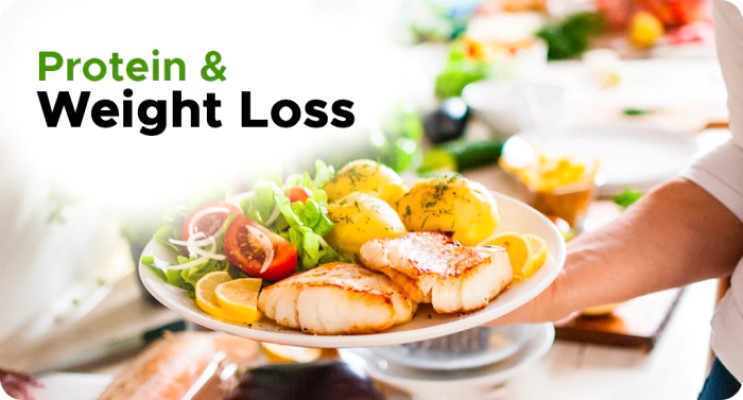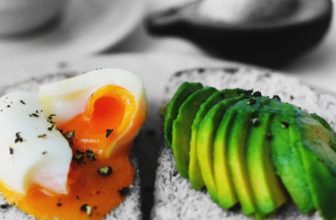
Protein is an essential nutrient that plays an important role in weight loss. It is a building block for muscle, skin, hair, and other tissues, and it helps to keep you feeling full and satisfied. Incorporating more protein into your diet can help to boost metabolism, reduce cravings, and support weight loss.
Here are a few tips for incorporating more protein into your diet:
- Eat more lean proteins: Lean proteins such as chicken, turkey, fish, and lean cuts of beef are excellent sources of protein. They are also low in fat and calories, making them ideal for weight loss.
- Include more plant-based proteins: Plant-based proteins such as beans, lentils, and quinoa are also excellent sources of protein. They are also low in fat and calories, making them ideal for weight loss.
- Add protein to your snacks: Incorporating protein into your snacks can help to keep you feeling full and satisfied throughout the day. This can include things like Greek yogurt, nuts, and hard-boiled eggs.
- Use protein powder: Protein powder is a convenient and easy way to add more protein to your diet. You can add it to smoothies, oatmeal, or baked goods.
- Try High-Protein recipes: Look for recipes that are high in protein such as stir-fried dishes, salads, soups, and casseroles.
It’s important to note that protein alone will not lead to weight loss, rather a combination of a healthy diet and regular exercise is crucial for weight loss. Additionally, it’s important to consult with a healthcare professional before making any significant changes to your diet, especially if you have any pre-existing health conditions or are currently taking any medications.
In conclusion, Incorporating more protein into your diet can help to support weight loss by boosting metabolism, reducing cravings, and keeping you feeling.
FAQs
How much protein should I eat a day to lose weight?
The recommended daily intake of protein for weight loss can vary depending on a number of factors, such as age, sex, weight, and activity level. However, a general guideline is that adults should aim to consume between 0.8-1.2 grams of protein per kilogram of body weight per day.
For weight loss specifically, many experts recommend consuming at least 1 gram of protein per pound of body weight per day. This can help to boost metabolism, reduce cravings, and promote feelings of fullness and satiety.
For example, if you weigh 150 pounds, you should aim to consume at least 150 grams of protein per day. This can be achieved by eating a variety of protein-rich foods, such as lean meats, fish, eggs, beans, and lentils, as well as by incorporating protein-rich snacks and supplements into your diet.
It’s important to note that protein alone will not lead to weight loss, rather a combination of a healthy diet and regular exercise is crucial for weight loss. Additionally, it’s important to consult with a healthcare professional before making any significant changes to your diet, especially if you have any pre-existing health conditions or are currently taking any medications.
Does protein burn belly fat?
Protein is an essential nutrient that plays a vital role in weight loss, but it does not specifically target belly fat. Belly fat, also known as visceral fat, is located deep in the abdominal cavity and surrounds internal organs, it is the most dangerous type of fat. It is associated with an increased risk of heart disease, diabetes, and other chronic health conditions.
While protein can help to boost metabolism, reduce cravings, and promote feelings of fullness and satiety, which can contribute to weight loss, weight loss occurs when you burn more calories than you consume. To lose belly fat, it is important to focus on creating a calorie deficit through a combination of diet and exercise.
Protein can be a helpful component of a weight loss diet because it takes more energy to digest than carbohydrates or fats, which can help to boost metabolism. Additionally, protein-rich foods tend to be more filling than foods that are high in carbohydrates or fat, which can help to reduce cravings and overeating.
It’s important to note that a healthy diet, regular exercise, and stress management are all important for weight loss, including belly fat reduction. Additionally, it’s important to consult with a healthcare professional before making any significant changes to your diet, especially if you have any pre-existing health conditions or are currently taking any medications.
Does protein burn fat without exercise?
Protein is an essential nutrient that plays a vital role in weight loss, but it does not burn fat without exercise. To lose weight, you need to create a calorie deficit, which means you need to burn more calories than you consume. Eating a diet high in protein can help to boost metabolism and reduce cravings, which can contribute to weight loss. However, it is not enough to rely on protein alone to burn fat without exercise.
Protein-rich foods tend to be more filling than foods that are high in carbohydrates or fat, which can help to reduce cravings and overeating. However, it’s important to note that consuming too much protein can also lead to weight gain if it’s not balanced with the right amount of healthy fats, carbohydrates, and the appropriate amount of calories.
Regular exercise is essential for weight loss because it helps to increase muscle mass, boost metabolism, and burn calories. It is also important for overall health and well-being. A combination of diet, exercise, and stress management are important for weight loss, including belly fat reduction.
Additionally, it’s important to consult with a healthcare professional before making any significant changes to your diet, especially if you have any pre-existing health conditions or are currently taking any medications.
Which protein food is best for weight loss?
There are many protein-rich foods that can be beneficial for weight loss. Here are some of the best options:
- Chicken breast: Lean cuts of chicken are low in calories and fat, but high in protein.
- Fish: Fish such as salmon and tuna are rich in protein and omega-3 fatty acids, which have been shown to promote weight loss.
- Eggs: Eggs are a great source of protein, and they are also relatively low in calories.
- Greek yogurt: Greek yogurt is a good source of protein and calcium, which can help to boost metabolism and promote weight loss.
- Beans and lentils: These plant-based protein sources are also rich in fiber, which can help to reduce cravings and promote feelings of fullness and satiety.
- Tofu: Tofu is a versatile, plant-based protein source that can be used in a variety of recipes.
- Whey protein: Whey protein is a high-quality protein supplement that can be added to smoothies, oatmeal, and other foods to boost protein intake.
It’s important to note that a healthy diet, regular exercise, and stress management are all important for weight loss. Additionally, it’s important to consult with a healthcare professional before making any significant changes to your diet, especially if you have any pre-existing health conditions or are currently taking any medications.
Which food is king of protein?
There are many foods that are high in protein, but some are considered to be particularly rich sources. Here are some of the foods that are considered to be the “king of protein”:
- Eggs: Eggs are a great source of protein, and they are also relatively low in calories.
- Lean beef: Beef is a rich source of protein, and lean cuts are relatively low in fat.
- Chicken breast: Lean cuts of chicken are low in calories and fat, but high in protein.
- Turkey breast: Turkey is a lean protein source that is high in protein and low in fat.
- Fish: Fish such as salmon and tuna are rich in protein and omega-3 fatty acids, which have been shown to promote weight loss.
- Greek yogurt: Greek yogurt is a good source of protein and calcium, which can help to boost metabolism and promote weight loss.
- Cottage cheese: Cottage cheese is a good source of protein, and it’s also relatively low in calories.
- Tuna fish: Tuna is a low-calorie and low-fat protein source that is high in omega-3s.
It’s important to note that a healthy diet, regular exercise, and stress management are all important for weight loss. Additionally, it’s important to consult with a healthcare professional before making any significant changes to your diet, especially if you have any pre-existing health conditions or are currently taking any medications.
Which fruit is full of protein?
Fruits are generally not as high in protein as an animal or plant-based protein sources, but there are some fruits that do contain a significant amount of protein. Here are some fruits that are relatively high in protein:
- Avocado: Avocados are a good source of healthy fats, and fiber and they contain around 2 grams of protein per avocado.
- Guava: Guava contains 4 grams of protein per cup, which is more than most fruits.
- Dried apricots: Dried apricots contain about 3 grams of protein per 100 grams.
- Kiwi: Kiwifruit is a good source of vitamin C and potassium, and it contains around 2 grams of protein per fruit.
- Jackfruit: Jackfruit contains 2 grams of protein per cup.
- Starfruit: Starfruit contains 2 grams of protein per fruit.
- Blackberries: A cup of blackberries contains around 1.5 grams of protein.
It’s important to note that a healthy diet, regular exercise, and stress management are all important for weight loss. Additionally, it’s important to consult with a healthcare professional before making any significant changes to your diet, especially if you have any pre-existing health conditions or are currently taking any medications. It’s also important to keep in mind that while these fruits may contain some protein, they should not be the main source of protein in your diet.
What protein burns the most fat?
Protein is an important nutrient that can help to promote weight loss by increasing satiety and helping to preserve lean muscle mass. All types of protein can be beneficial for weight loss, but some sources may be more effective than others. Here are some types of protein that have been shown to be particularly effective for burning fat:
- Whey protein: Whey protein is a fast-digesting protein that has been shown to increase muscle mass, boost metabolism and reduce appetite.
- Casein protein: Casein protein is a slow-digesting protein that can help to keep you feeling full for longer periods of time.
- Egg protein: Egg protein is a high-quality protein that is easily digestible and has been shown to promote weight loss.
- Fish protein: Fish protein is rich in omega-3 fatty acids, which have been shown to promote weight loss and improve heart health.
- Soy protein: Soy protein is a plant-based protein that has been shown to reduce appetite and promote weight loss.
It’s important to note that a healthy diet, regular exercise, and stress management are all important for weight loss. Additionally, it’s important to consult with a healthcare professional before making any significant changes to your diet, especially if you have any pre-existing health conditions or are currently taking any medications. It’s also important to keep in mind that while these types of protein may be beneficial for weight loss, they should be part of a well-rounded diet that includes a variety of other nutrient-dense foods.




